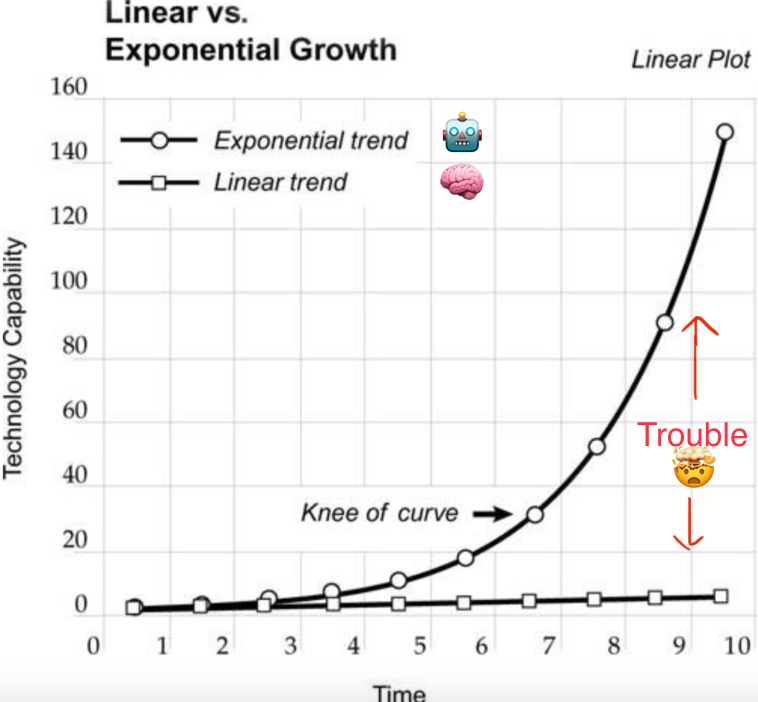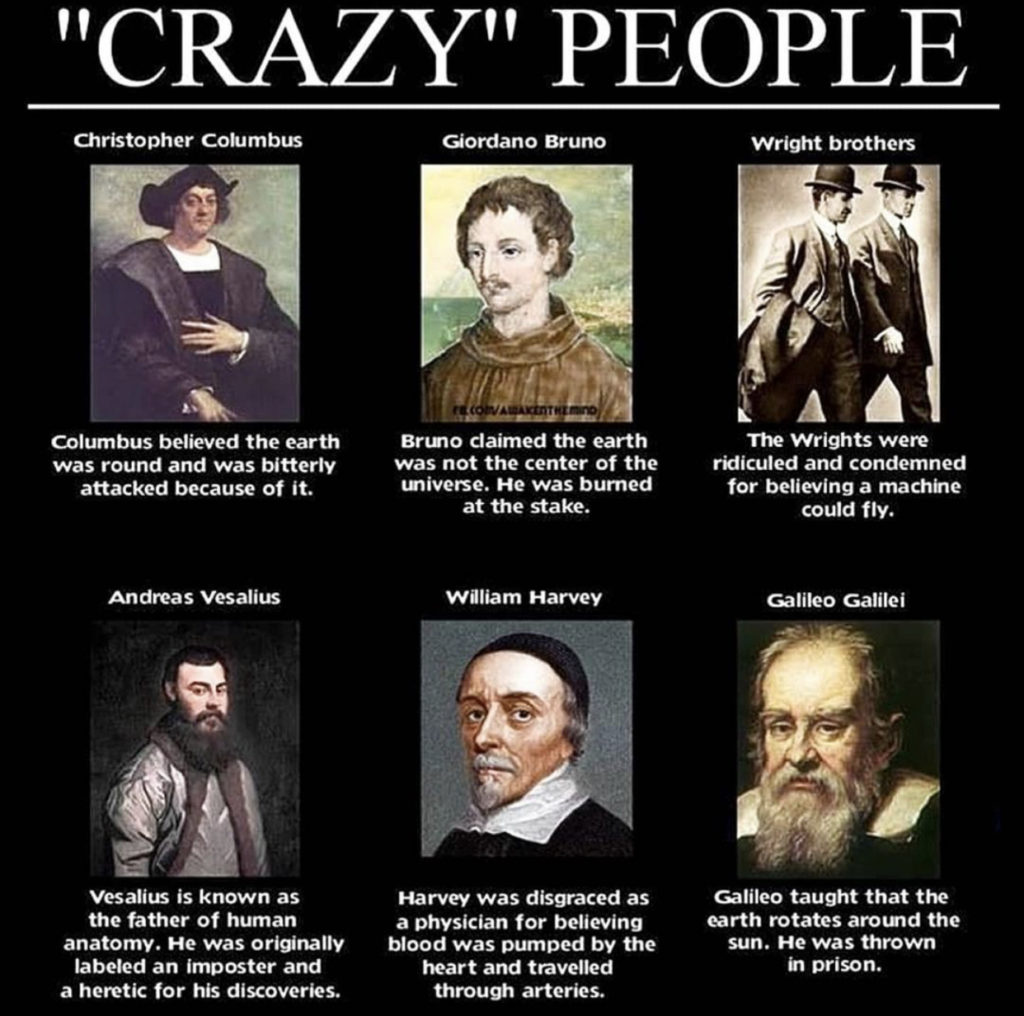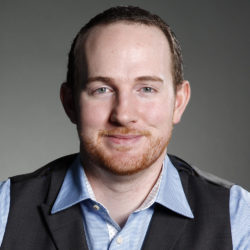
Albert Einstein is famous for many reasons, and left behind many memorable quotes about all manner of intelligent subjects. That said, my favorite quote of his, by far, is this:
“Only two things are infinite, the universe and human stupidity, and I’m not sure about the universe.”
Not a day goes by that I don’t think of this quote. Walking down the street. Driving. Reading posts on Facebook or Twitter. Wars, mass shootings, moronic politics. Observing people, anywhere, it is constantly obvious…
Humans are incredibly fucking STUPID.
And yet…
Humans are also creative, and in many ways truly brilliant. No other species on our planet has, or is even remotely capable of, accomplishing what we’ve accomplished. And our future potential is virtually unlimited.
But herein lies the problem, this juxtaposition of stupidity and brilliance.
The brain evolved for survival, for procreation and self-defense…but it evolved in a time when everything was trying to eat us, and where our literal survival was a daily concern.
But the brain evolves slowly. A small but significant evolutionary change can take thousands or even tens of thousands of years to develop. A huge change can take hundreds of thousands if not millions of years.
For the first few million years of “human” existence, that was fine. Daily life, and the threats we faced, remained largely constant across immense measures of time. Hunt, gather, eat, sleep, procreate, try not to get eaten, or poisoned, or injured. Good times.
This slow and measured pace was probably fine up until a few thousand years ago, when large groups of people began living together, and the dawn of civilization as we know it began to take shape.
There’s some evidence that part of the evolution of the human brain stemmed from living and working in groups…but historically those groups were very, very small, usually less than 100 people. We’re not well equipped mentally for larger groups, and Dunbar’s number is a thing for a reason. We’re good for small villages, maybe 50-150 people give or take. More than that, and things begin to fray.
So here we have Root Problem #1 – too many people, too close together, breeds conflict. Us vs. them. Haves and have nots. Our planet has WAY too many people, divided into WAY too many factions, with many living WAY too close together.
What’s wrong with that you say? Diversity is a good thing you say?
Sort of. In some ways, diversity is great. Genetic diversity seems to be a good thing. Diversity of thought as well, as curiosity drives most innovation. But the level of diversity we have, well, it’s become more divisive than simply diverse.
Because of our small group wiring, the further we are mentally and emotionally from another group, the less like us, the less “human”, we perceive that group to be. This is known as Dehumanization, and it’s not a good thing if you’re trying to avoid conflict.
And again, back in the day, when resources were scarce and your group was your literal lifeline, that made sense. But we live in an age of true abundance, and this cognitive holdover is no longer appropriate.
Now, another evolutionary peculiarity of the human brain is its optimization for efficiency. The brain makes up 2% of your body weight, but consumes 20% of your calories. It consumes 10x more energy by weight than the rest of the body…and that’s after all of the developmental and cognitive tradeoffs evolution has made in the name of “efficiency”.
What sort of tradeoffs? Oh boy, where to start. It’s a loooong list, but you could break it down into 3 key buckets: awareness, memory, and shortcuts.
First, the brain achieves a degree of efficiency by filtering out a large portion of stimuli from ever hitting conscious awareness. This is called latent inhibition.
Your senses process way, way more input than you ever become consciously aware of (an estimated 11,000,000 bits of sensory data with just 50 bits of that hitting conscious awareness), and what little sensory data does pass through is often skewed for a variety of reasons.
Your brain consists of two main “systems”, to use the terminology from the amazing book Thinking, Fast and Slow. System 1, the lizard brain, is highly efficient and handles the majority of routine tasks. System 2, what we think of as “conscious” us, is not energy efficient, and is called on primarily to handle new and potentially important information.
In the name of efficiency, System 1 tries to involve System 2 as little as possible. System 2 thinks it runs the show, but in reality System 2 has no fucking clue what’s going on most of the time.
Thus, your awareness is greatly limited, without you ever being aware 🙂
Second, you have memory. Your brain doesn’t have unlimited long-term storage, and has incredibly limited short-term storage. In order to maximize this, the brain tosses out info that it deems unimportant.
This often results in modified, fragmented memories. And of course, when you recall a memory, you edit and re-encode the memory, making it possible to dramatically change your memories, and thus skewing your personal “reality” even further.
This is the reason police get witness statements immediately, and why those witness statements often differ from the testimonies given in trial. Oops.
Third, and possibly most important, you have shortcuts, aka cognitive biases. Confirmation bias. Survivorship bias. Rhyme as reason effect. The Forer effect.
There are literally hundreds of biases, each of which represents a mental shortcut. These shortcuts exist for energy efficiency, but they come with MASSIVE tradeoffs.
For example, cognitive dissonance. Scientists have found that the brain treats physical threats and social/intellectual threats to closely held beliefs more or less the same way. This is why people can get so irrational when their beliefs are contradicted. This is known as cognitive dissonance.
The brain is stuck in an era where basically all threats were life or death, and so it tries to protect itself even from threatening ideas. And, enter the backfire effect.
Good old brain, protecting us from…ideas. Yeah. Good job brain. Thanks a million.
So, Root Problem #2 – the brain is stuck in a bygone era, can’t adapt fast enough to keep up with modern society and rapidly improving technology, and is prone to overreacting to “threats”. It’s made some really shitty tradeoffs in the name of efficiency, which has resulted in everyone existing in their own little reality bubbles.

Last, but far from least, you have the conjoined desires for power and greed.
Again, these share an evolutionary root. Having more for yourself equates to less risk and a greater chance to not just survive, but to thrive. Power means less dangerous work for you, more safety, more opportunities to mate, and so on. Greed and the desire for power stem from our survival wiring.
Some are more wired for this than others, for a variety of reasons stemming from both nature and sometimes nurture. We may think of such people as Alphas, and we see this mindset in many leaders and rulers, in CEOs and politicians.
But again, this is a scarcity mindset, built by a brain that has evolved to see virtually all facets of life as a zero-sum game. It’s all life and death, urgent and important. Or so our brains seem to think.
The outcome of such a mindset is the inequality we see virtually worldwide.
The world we know was built by powerful people, is run by powerful people, and those powerful people have immense incentive to keep many “unfair” things the way they are. As Lord Acton so eloquently stated, “Power tends to corrupt, and absolute power corrupts absolutely.”
So there you have Root Problem #3, the drive for survival (and comfort) at all costs, and the greed and lust for power that can stem from it.
And so we have a rather terrible biological trifecta: our wiring for small groups, for an energy efficient brain, and for our own survival and comfort.
While these were all extremely helpful in the distant past, in tundra and jungles and primitive camps and villages, they are far less useful in the world that we’ve created.
In a world of densely populated cities, with rapidly rising global internet usage and connectedness, with technology increasing at a genuinely exponential pace, and with many former risks falling by the wayside…our brain just can’t keep up.
I’d posit that every problem we currently face as a civilization stems from this, our brain’s inability to keep pace biologically with our advances in technology and rapidly changing societies.
The problems we face today, at their core, are essentially the same problems humanity has faced for the last ~10,000 years. Why, in all that time, and with all our advances, have we not been able to eliminate war? Eliminate poverty? Eliminate illness, and inequality, and insensitivity?
Because we haven’t been able to fundamentally change our brains.
And so, if we want a utopia, a world of peace and joy and happiness, free from strife and anger and hatred, then we MUST take over our own evolution. We need to change our brains, update our code, and get our biology more in-line with our technology and our ideals.
We must become Transhuman.
But what exactly does that mean?
Do we learn to edit and overwrite our genetic code, turning ourselves into biologically superior versions of ourselves?
Do we augment ourselves with technology, merging man and machine to become cyborgs?
Do we learn to emulate human brains and consciousness in machines and transfer ourselves over?
All are possible. I’d even argue that all are probable. There are research teams making mind-boggling advances in each of these realms right now. We can do things today that would have been unbelievable even 10 years ago, and we’ll be seeing things in the next 10 years that may well seem like magic today.
What it means to “be human” is going to have to change. A lot. And I think, all told, that’s a good thing. We truly need to change, to see the change we want to see in the world.
Some of these technologies, these changes we’re seeing and experiencing and that will soon be coming, bring out a great deal of fear in many people. Some minor fears. Some apocalyptic fears.
And while I can’t discount the potential validity of those fears, I perceive many of them as what they likely are: an antiquated analog brain resisting an increasingly digital reality it simply isn’t equipped to deal with.
When I hear these fears expressed, I always think back to a Morpheus quote from The Matrix:
“You have to understand, most of these people are not ready to be unplugged. And many of them are so inured, so hopelessly dependent on the system, that they will fight to protect it.”
It’s not their fault. For now, their brains are the way they are, and so many human responses are hardcoded and inflexible. The brain fights for survival, against threats both real and imagined (very often imagined).
Mark Twain once said, “I am an old man and have known a great many troubles, but most of them never happened.” Spot on. Most fears are unfounded and go unrealized.
There’s a reason that progress and enlightenment tend to come from a handful of people, dragging the rest of the world along kicking and screaming.
It’s a lot like trying to get my 6-year old to try a new food. He fights, resists, struggles…finally takes a little nibble…and then is like, “OMG, best thing ever, where has then been all my life daddy and why haven’t I had it before, how could you keep this from me nom nom nom.”
There’s a reason that brilliant minds throughout history, minds who were often far ahead of their times, have so often been persecuted and even killed for their discoveries and beliefs. They make the average analog brain intensely uncomfortable. And they upset the status quo, at times shifting the balance of power from those who currently hold it into the hands of the masses.
But those minds keep appearing, and they keep doing what they do; taking off the blinders, forcing people to see from a different point of view, expanding their horizons, adding to their knowledge and enriching their lives.
They are catalysts for change. Heretics 😁

And so…I have hope.
I see people in the world like Elon Musk, Peter Diamandis, Bryan Johnson, Craig Venter, Aubrey de Grey, Ray Kurzweil, and numerous others working to advance our civilization. Their work isn’t easy. They face resistance. Disbelief. Anger. Suspicion.
But I believe they’ll persevere, and in time (perhaps less than we think), succeed.
Progress can’t, and won’t, be stopped. And humanity, or rather what humanity will become, will be better for it.
